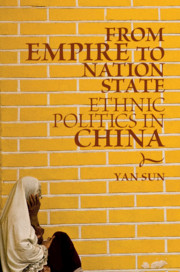Crossref Citations
This Book has been
cited by the following publications. This list is generated based on data provided by Crossref.
Spolsky, Bernard
2021.
Qinsheng Zhou: Ethnic Minority Languages in China: Policy and Practice.
Language Policy,
Vol. 20,
Issue. 2,
p.
291.
Bulag, Uradyn E.
2021.
Minority Nationalities as Frankenstein’s Monsters? Reshaping “the Chinese Nation” and China’s Quest to Become a “Normal Country”.
The China Journal,
Vol. 86,
Issue. ,
p.
46.
Caskey, Gregory W.
and
Murtazashvili, Ilia
2022.
The predatory state and coercive assimilation: The case of the Uyghurs in Xinjiang.
Public Choice,
Vol. 191,
Issue. 1-2,
p.
217.
Ho, Wai-Yip
2023.
Islam, chineseness and citizenship: Sinicizing Muslim minority, becoming Chinese citizen.
Citizenship Studies,
Vol. 27,
Issue. 6,
p.
712.
Heberer, Thomas
2023.
Die politischen Systeme Ostasiens.
p.
45.
Baird, Ian G.
2024.
The Communist Party of Thailand's education for young children in Northern Laos and Southern China.
South East Asia Research,
Vol. 32,
Issue. 3,
p.
283.
Sutton, Donald S.
2024.
Territorialization and ethnic control in China’s borderlands: Aba prefecture in the People’s Republic, 1950–2020.
Eurasian Geography and Economics,
Vol. 65,
Issue. 6-7,
p.
753.
Huang, Yanjie
2024.
Ideology Strikes Back: China’s Lessons of the Soviet Collapse, 1992–2022.
Problems of Post-Communism,
Vol. 71,
Issue. 6,
p.
579.
Glasserman, Aaron Nathan
2024.
Organizing Dots and Lines: Eastern Hui and the Adaptation of the CCP's Nationalities Work in the Revolutionary Era.
The China Quarterly,
Vol. 258,
Issue. ,
p.
367.



